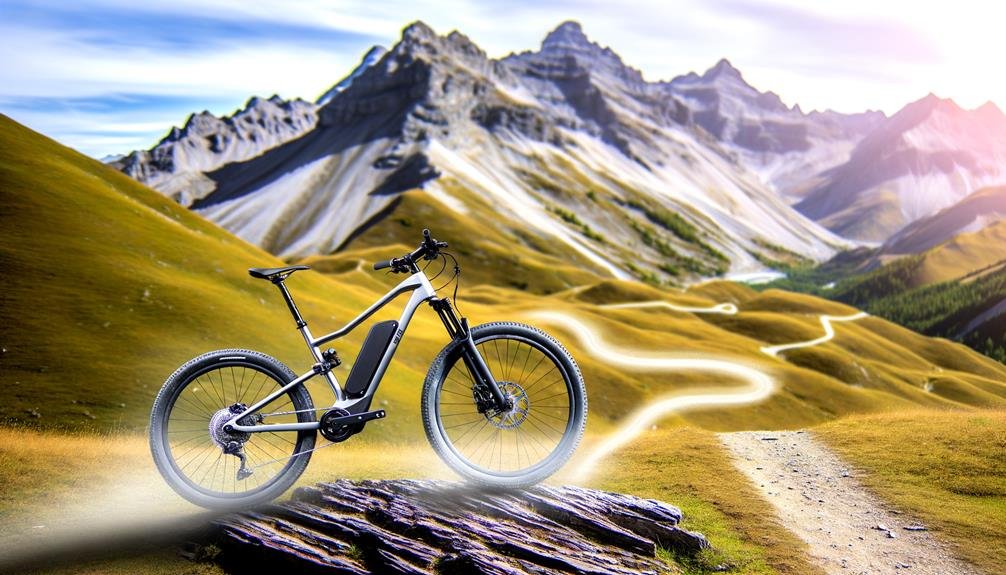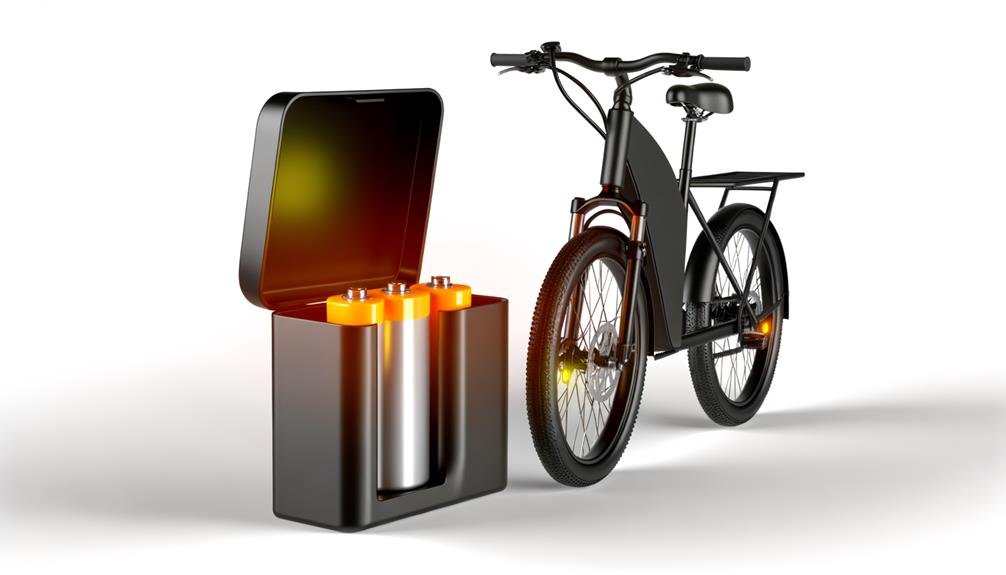Charles Miller is a veteran bike enthusiast with over 12 years of experience dealing with bikes as a mechanic. Despite immense love and expertise for...
The weight of a Trek electric bike is contingent upon its specific model and the components used. This weight is a critical factor in the bike's performance and maneuverability. For example, Trek's high-end E-Caliber series showcases a significant variance in weight when the Fazua electric drive system is included or removed.
Across the Trek lineup, there is a diverse range of models, each with differing materials and design elements that contribute to their weight. It is crucial to analyze the implications of these weight differences on the overall cycling experience.
In the following discourse, we will explore in detail the weight aspects across various Trek electric bike models. We will also examine the impact of weight on the bike's performance and discuss the advantages conferred by lighter designs.
Key Takeaways
- The weight of Trek electric bikes varies depending on the specific model and components used.
- The lightest full-suspension eMTB from Trek weighs 15.75 kg (34.72 lb) or 12.45 kg (27.45 lb) without the Fazua electric drive system.
- The Fazua drive system adds approximately 3.3 kg (7.27 lb) to the overall weight of the E-Caliber.
- The weight of the battery significantly influences the overall weight, handling, and maneuverability of the electric bike.
Understanding Trek Electric Bike Weight
In examining the weight of Trek electric bikes, it's essential to highlight the E-Caliber line, which boasts the lightest full-suspension eMTB on the market, with the top model tipping the scales at 15.75 kg (34.72 lb), or 12.45 kg (27.45 lb) without the Fazua unit.
This electric bike, falling within the category: Electric hybrid bikes, represents a unique blend of electric power and lightweight design, suitable for country-style riding.
The E-Caliber's minimal weight is achieved through a carbon frame and lightweight components, keeping the total weight limit (combined with the rider) within an impressive range. The Fazua drive system, with 250W continuous power and a 250 Wh battery capacity, contributes to a maximum total weight limit of 165 kg.
This hybrid bike's electric assist system allows the Fazua battery and motor to be removed, transforming the bike into a pedal-only mountain bike, reducing the total weight limit (combined) even further.
Trek markets the E-Caliber as an all-purpose electric mountain bike, suitable for a wide range of trails and riding styles. This model is an embodiment of the brand's commitment to combining functionality and style in their creations, thereby fostering a sense of belonging among users.
Comparing Electric and Non-Electric Bikes
When comparing electric and non-electric bikes, several factors come into play that influence the overall performance and riding experience.
Firstly, the additional weight of the electric components, while offering the benefit of pedal assistance, can potentially affect the handling and agility of the bike. It is crucial to analyze how this weight difference, particularly the contribution of the battery, impacts both the cycling performance and the versatility of the riding experience.
Weight Differences: Electric Vs. Non-Electric
Distinguishing between the electric E-Caliber and its non-electric counterpart, the Supercaliber, it becomes evident that the inclusion of the Fazua electric drive system contributes a notable difference in weight, adding approximately 3.3 kg (or 7.27 lb) to the overall mass of the bicycle. This weight difference is a crucial factor to consider when deciding your next bike and the e-systems on Trek bikes offer a new lifestyle approach.
| Bike Model | Weight (kg) |
|---|---|
| E-Caliber | 15.75 |
| Supercaliber | 12.45 |
| Verve+ 4S Lowstep | Maximum Load 25 |
Your local Trek shop can advise on the best electric hybrid bikes for your needs. Once your e-bike has served its purpose, responsibly recycle your e-bike to further contribute to sustainable living.
Impact on Cycling Performance
The addition of the Fazua electric drive system in the E-Caliber line significantly alters the cycling performance, transforming a traditional mountain bike into a versatile, all-terrain e-bike that caters to a wide range of trails and riding styles.
This system, also found in Trek and Electra e-bikes, allows riders to meet the latest e-bike trends with a seamless blend of power and control. The MT200 hydraulic and XX1 AXS components ensure precision while the motor offers an impressive torque, enhancing the Verve+ 2 Lowstep and Verve+ 3 Lowstep models.
The Bosch Purion display, an important addition in all Trek e-bikes, allows riders to monitor their performance.
Visit a Trek shop for professional advice on these advanced features.
Understanding Battery Weight Contribution
In light of these advanced features, it's equally crucial to consider the weight contribution of the battery in Trek's electric bikes, as it significantly influences the bike's overall weight, handling, and maneuverability, especially when compared to their non-electric counterparts.
- Weight impact: A Trek e-bike's battery can add substantial weight, influencing the maximum limit the bike can carry.
- Third-party testing: Trek e-bikes are third-party tested, including the stringent UL 2849 certification — so, quality is ensured.
- Non-electric comparison: Without a battery, a non-electric bike has a maximum weight limit that's significantly lower.
- Continuous evaluation: The new line of Trek e-bikes requires continuous assessment of battery weight to ensure optimal performance.
Understanding these factors fosters a sense of belonging among Trek e-bike users, as they gain deeper insight into the product's intricate design.
Weight Impact on Performance
The weight of Trek's electric bikes, such as the E-Caliber 9.9 XX1 AXS, significantly influences their performance metrics including speed, maneuverability, and handling.
A nuanced interplay exists between the bike's weight and its speed capabilities, with lighter bikes often being more agile but potentially less stable at higher speeds.
Furthermore, the bike's weight can dramatically affect its performance depending on the terrain of use, with heavier bikes sometimes advantageous in rough or steep landscapes.
Performance Factors in Heaviness
Weight plays a crucial role in the performance of Trek's electric bikes. Particularly in models such as the E-Caliber 9.9 XX1 AXS, where the use of lightweight components and a carbon frame contribute to a reduced overall weight, enhancing speed and maneuverability for cross-country style riding.
Trek Verve+ 3, with its alloy rear rack, can support a cargo of 300 pounds without compromising speed or control.
All Trek electric bikes are third-party tested to meet the stringent UL 2849 certification — so they are compliant with UL safety standards, reflecting reliability in performance.
The Hydraulic disc brakes ensure safe and effective stopping power, vital for heavier loads.
With a trekbikes.com purchase, buyers can use the pedal guide and find the perfect bike, factoring in the performance factors in heaviness.
Weight Versus Speed Trade-off
Despite being lightweight, the E-Caliber's design does not compromise on speed or performance, as evidenced by its top-of-the-line model which weighs only 15.75 kg (34.72 lb) or 12.45 kg (27.45 lb) without the Fazua unit.
This weight versus speed trade-off is expertly managed in the Trek electric bike, allowing riders to have an exhilarating ride on this mountain bike. The lightweight bike assures quick acceleration and easy handling, essential qualities for adventures on a Trek.
If you're not fully satisfied in its new condition within 30 days, a Trek Travel trip will convince you of its performance. The sealed cartridge and Hard-Case with the proven durability further add to the bike's appeal, making it a perfect companion for avid bikers.
Impact of Terrain on Weight
Navigating through varying terrains, the E-Caliber's lightweight design, a mere 15.75 kg (34.72 lb) that can be further reduced to 12.45 kg (27.45 lb) without the Fazua unit, significantly influences its performance and adaptability.
- Trek's electric bike is designed to adapt to a new condition within the cycling terrain, offering enhanced performance due to its weight.
- Fueled by Los Angeles brewed ingenuity, the E-Caliber easily navigates through any terrain, from the ultimate in flat trails to challenging inclines.
- When the rider decides to Trek his car keys at home and ride on bike, the reduced weight offers a seamless and effortless ride.
- The E-Caliber is Blendr compatible, offering a user-friendly experience, further enhancing the impact of terrain on the bike's weight.
Trek Electric Bike Models and Their Weights
How does Trek achieve the remarkable feat of producing the lightest full-suspension eMTB on the market? The secret lies in the combination of a carbon frame, lightweight components, and a short travel suspension. One of the popular Trek electric bike models is the E-Caliber, which weighs just 12.45 kg without the Fazua unit. With the unit, the bike's weight increases to 15.75 kg, making it one of the lightest full-suspension eMTBs available.
Here's a glimpse of some Trek electric bike models and their weights:
| Model | Features | Weight |
|---|---|---|
| E-Caliber | Fazua drive system, 250W continuous power | 15.75 kg |
| Verve | Purion display, XLSpanninga SOLO for e-bike | 22.7 kg |
| Satellite Elite | Shimano STEPS system, integrated lighting | 18.6 kg |
The weight of an electric bike is a crucial factor in its performance. Whether you're curious about the Verve, Satellite Elite, or another model, understanding how heavy a Trek electric bike is can help you make an informed choice. Remember, the right bike is the one that best fits your needs and preferences.
Maneuverability of Trek Electric Bikes

While understanding the weight of Trek's electric bikes is crucial for assessing their performance, it is equally important to consider their maneuverability, particularly when navigating varied terrains. Trek's e-bikes offer an impressive combination of low weight and high performance, thanks to their alloy frames and high-quality components.
Pedals: The right pedals can significantly improve maneuverability. We recommend flat pedals for beginners due to their ease of use and ability to boost control. Experienced riders may find the best pedals that suit their riding style, such as clipless pedals for increased efficiency.
Alloy Frame: Trek's lightweight alloy frame contributes to the bike's low overall weight, enhancing its maneuverability and responsiveness.
Braking System: Trek e-bikes feature disc brakes, which offer the absolute strongest stopping power. This feature increases control, especially on steep descents and in wet conditions.
Upgrading Components: To further enhance maneuverability, riders can upgrade components. Upgrade your pedals or switch to a lighter, more responsive handlebar.
As a community of biking enthusiasts, we understand the need for a bike that fits your style and ambitions. Trek's electric bikes offer this versatility, ensuring you feel a sense of belonging on every ride.
Benefits of Lighter Electric Bikes
Exploring the benefits of lighter electric bikes reveals a myriad of advantages, ranging from improved maneuverability and increased range to enhanced control and convenience. As fellow enthusiasts, we understand the appeal of an agile, responsive ride.
Lighter electric bikes, such as the Trek model, offer the absolute strongest returns in this regard, even though this bike comes with a higher price tag.
One of the primary benefits is increased range. According to an accredited testing laboratory, the lighter the bike, the further it can travel on a single charge. This means that a lighter Trek bike lasts longer than competing heavier models, offering both efficiency and convenience.
Another advantage lies in the realm of safety. Compliant with leading safety standards, lighter bikes provide improved acceleration and braking performance. This enhanced control is particularly beneficial when navigating through busy city streets or tackling challenging terrains.
Lastly, the convenience of lighter bikes cannot be understated. Bikes ordered online ship for free, and their reduced weight makes handling and storage much easier. This makes lighter electric bikes an excellent choice for those who value both performance and convenience.
Frequently Asked Questions
How Much Does a Trek Electric Bike Weigh?
A Trek electric bike's weight, influenced by factors such as battery impact and frame materials, varies across models. Typically, they weigh between 12.45 kg to 15.75 kg, affecting speed, portability, and riding comfort.
How Much Should an Electric Bike Weigh?
An electric bike's weight varies due to factors like battery weight, frame materials, and manufacturer variations. Weight impacts performance and portability. Lightweight alternatives exist, but comfort factors and weight distribution also play key roles in user experience.
Are Electric Bikes Heavy to Lift?
Lifting an electric bike can present portability challenges due to weight distribution. However, factors like bike materials, frame construction, weight reduction strategies, and individual strength requirements greatly influence the handling difficulty and transport solutions.
Are Electric Bikes Too Heavy for Bike Rack?
Rack durability and adaptability are critical when transporting electric bikes due to their weight. Mounting challenges may arise, thus suitable carriers with high weight limitations and proper installation are required to ensure safety during transport.
Conclusion
In conclusion, the weight of a Trek electric bike significantly contributes to its performance, maneuverability, and overall user experience.
The innovative use of lightweight materials such as carbon and the integration of the Fazua electric drive system allow for a lighter design, which enhances speed and handling.
Careful consideration of bike weight can greatly impact the satisfaction of the rider, making Trek's lightweight electric bikes a notable choice in the cycling industry.

Charles Miller is a veteran bike enthusiast with over 12 years of experience dealing with bikes as a mechanic. Despite immense love and expertise for his Tacoma, he rides his Trek Ebike more. Anytime you meet him, you’ll either hear him talking about Bikes, or writing about all things bikes and cars on this blog.
More Posts


